Understanding and Managing Anxiety in Older Adults
Anxiety affects approximately 10-20% of the elderly population, often going undiagnosed due to overlapping symptoms with age-related health issues. Recognizing the multifaceted nature of anxiety in seniors is crucial for implementing effective, non-medication-based management strategies. This article explores psychosocial interventions, lifestyle modifications, assessment techniques, and caregiver roles in managing anxiety safely and effectively in elder care.
Non-Pharmacological Strategies for Anxiety Reduction in Seniors
How can anxiety in seniors be managed without medications?
Managing anxiety in older adults without relying on medications involves various psychological and lifestyle strategies. Psychological approaches like cognitive behavioral therapy (CBT) and Acceptance and Commitment Therapy (ACT) help seniors address irrational worries, change negative thought patterns, and develop healthier ways of coping.
Relaxation techniques are highly effective and include activities such as relaxation training, listening to calming music, engaging in yoga, and practicing mindfulness-based stress reduction (MBSR). These methods have been shown to significantly decrease anxiety symptoms over a period of weeks.
Physical activity, particularly outdoor walks and gentle exercises, not only improves physical health but also reduces mental stress. Connecting with nature or engaging in social activities further enhances well-being and helps to lower anxiety levels.
Complementary practices like aromatherapy and massage therapy may offer additional relief by promoting relaxation and reducing muscle tension. Making environmental modifications—such as creating a quiet, calming living space—and fostering strong social support networks are crucial. Social interactions, community involvement, and maintaining close relationships provide emotional comfort and decrease feelings of isolation.
Incorporating these non-pharmacological approaches into daily routines can help seniors manage anxiety effectively, improve their quality of life, and foster a sense of calm and security.
Recognizing Symptoms and Behavioral Signs of Anxiety in Older Adults
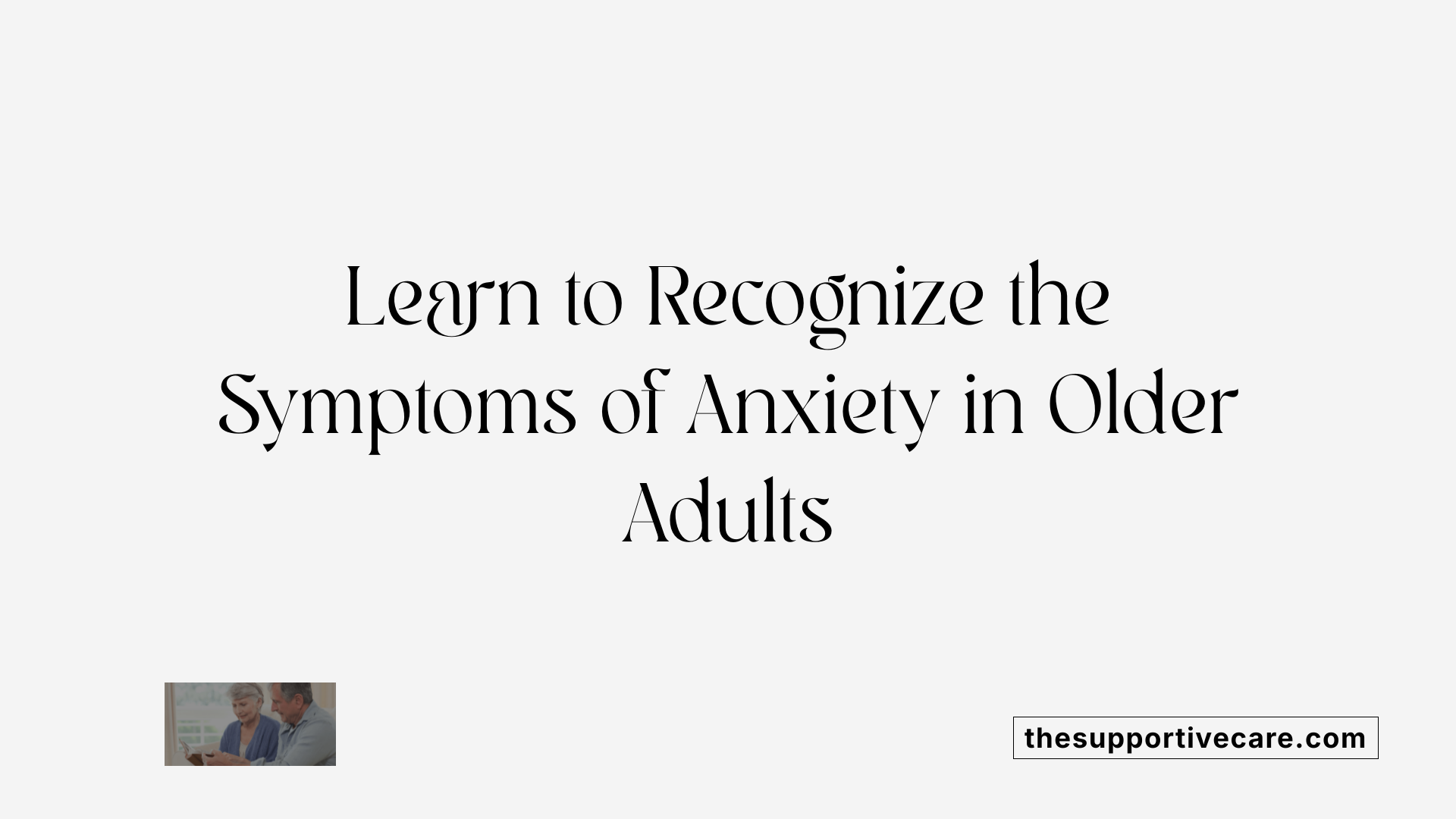
What are common symptoms and behavioral signs of anxiety in older adults?
Anxiety in the elderly often manifests through a range of physical, behavioral, cognitive, and psychological symptoms. Physical symptoms are common and may include a racing heart, trembling or shaking, excessive sweating, nausea, dizziness, and shortness of breath. These sensations can mimic or aggravate existing health conditions, making recognition challenging.
Behavioral signs include withdrawal from social activities, avoidance behaviors such as staying indoors or avoiding known places, and safety-seeking actions like checking locks repeatedly or hoarding items. Many older adults may become irritable or show emotional liability, reacting with heightened sensitivity or tearfulness.
Cognitive symptoms often involve irrational fears, forgetfulness, difficulty concentrating, or confusion, which can sometimes be mistaken for signs of cognitive decline or dementia. Sleep disturbances, such as insomnia or nightmares, are also prevalent, further exacerbating physical and mental health.
Physical complaints like headaches, stomach aches, muscle tension, and the feeling of choking or lightheadedness are common, often worsened by stressors such as chronic illnesses, grief, or social isolation. These symptoms can create a cycle that heightens anxiety, impacting overall well-being.
Recognizing these signs early is vital since anxiety in older adults is frequently undiagnosed and can lead to increased disability, cognitive decline, and poor physical health if untreated. Healthcare providers should carefully evaluate these symptoms, considering both medical conditions and mental health factors, to ensure appropriate treatment.
Causes and Underlying Factors of Anxiety in Elder Care
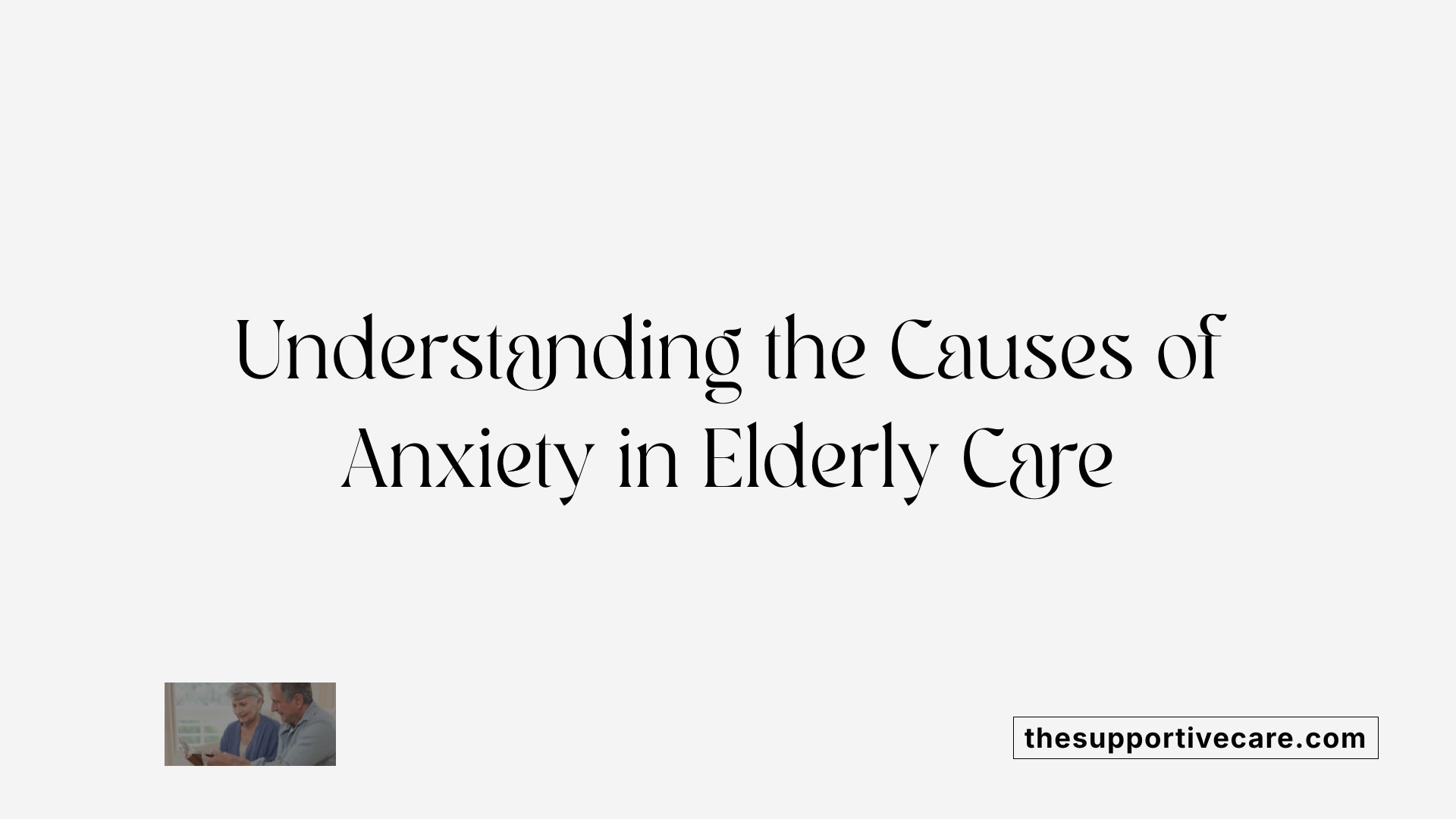
What are the main causes and underlying factors of anxiety in elderly care?
Anxiety in older adults is typically driven by a mix of physical health issues, psychological stressors, and environmental challenges. Chronic medical conditions such as heart disease, diabetes, and respiratory illnesses often contribute to fears regarding health deterioration and loss of independence.
Cognitive decline and sensory impairments, including vision or hearing loss, increase feelings of vulnerability and can heighten anxiety symptoms. For example, difficulties in seeing or hearing may lead to social withdrawal, further exacerbating feelings of isolation.
Psychosocial factors such as grief from the loss of loved ones, ongoing stress, and emotional trauma significantly influence anxiety levels. Experiencing multiple losses or dealing with end-of-life issues can intensify worries about mortality and aging.
Daily stressors like financial insecurity and the fear of becoming a burden to family members also play a role. Many seniors worry about paying medical bills, losing their savings, or not being able to meet basic needs.
Environmental factors, including mobility limitations and changes in daily routine or living situations, can trigger or worsen anxiety symptoms. Transitioning to assisted living or experiencing modifications in the home environment may also create stress and uncertainty.
Medications, especially those with side effects or interactions, can induce symptoms of anxiety or mimic anxiety behaviors. Neurodegenerative disorders, particularly dementia, and cognitive decline, increase susceptibility by affecting emotional regulation and judgment.
In sum, anxiety in the elderly often results from a complex interplay of physical health challenges, psychological burdens, and situational stressors, necessitating a comprehensive approach to assessment and treatment.
Assessment, Diagnosis, and Screening for Anxiety in Seniors
What approaches can be used to assess and diagnose anxiety in seniors?
Evaluating anxiety in older adults requires a thorough, multi-faceted approach. First, healthcare providers conduct detailed clinical interviews with the senior and, if possible, gather collateral information from caregivers or family members. These interviews focus on uncovering symptoms like excessive worry, fears related to aging or health, and behavioral changes.
Specialized self-report questionnaires play an essential role. Among the most trusted tools are the Geriatric Anxiety Inventory (GAI), the Geriatric Anxiety Scale (GAS), and the Adult Manifest Anxiety Scale for the Elderly (AMAS-E). These scales are validated for older populations and help quantify the severity of anxiety symptoms.
Observation of physical and behavioral signs further supports diagnosis. Symptoms such as restlessness, trembling, rapid heartbeat, sweating, or avoidance behaviors might be noted during clinical encounters. Additionally, signs like sleep disturbances, muscle tension, irritability, or obsessive thoughts can reinforce findings.
Understanding the fears common in seniors is crucial. Anxiety related to declining health, fear of falling, loss of independence, or the end of life are often prominent triggers.
Collaboration with healthcare professionals ensures a comprehensive assessment. It is vital to differentiate anxiety from other medical conditions like cardiac issues, thyroid imbalances, or side effects of medications which can mimic or exacerbate anxiety symptoms.
Overall, integrating medical examinations, validated assessment tools, behavioral observations, and caregiver input creates a reliable diagnostic process. Proper diagnosis is essential for developing effective treatment plans tailored to the unique needs of older adults.
Safe and Effective Non-Pharmacological Treatments for Elderly Anxiety
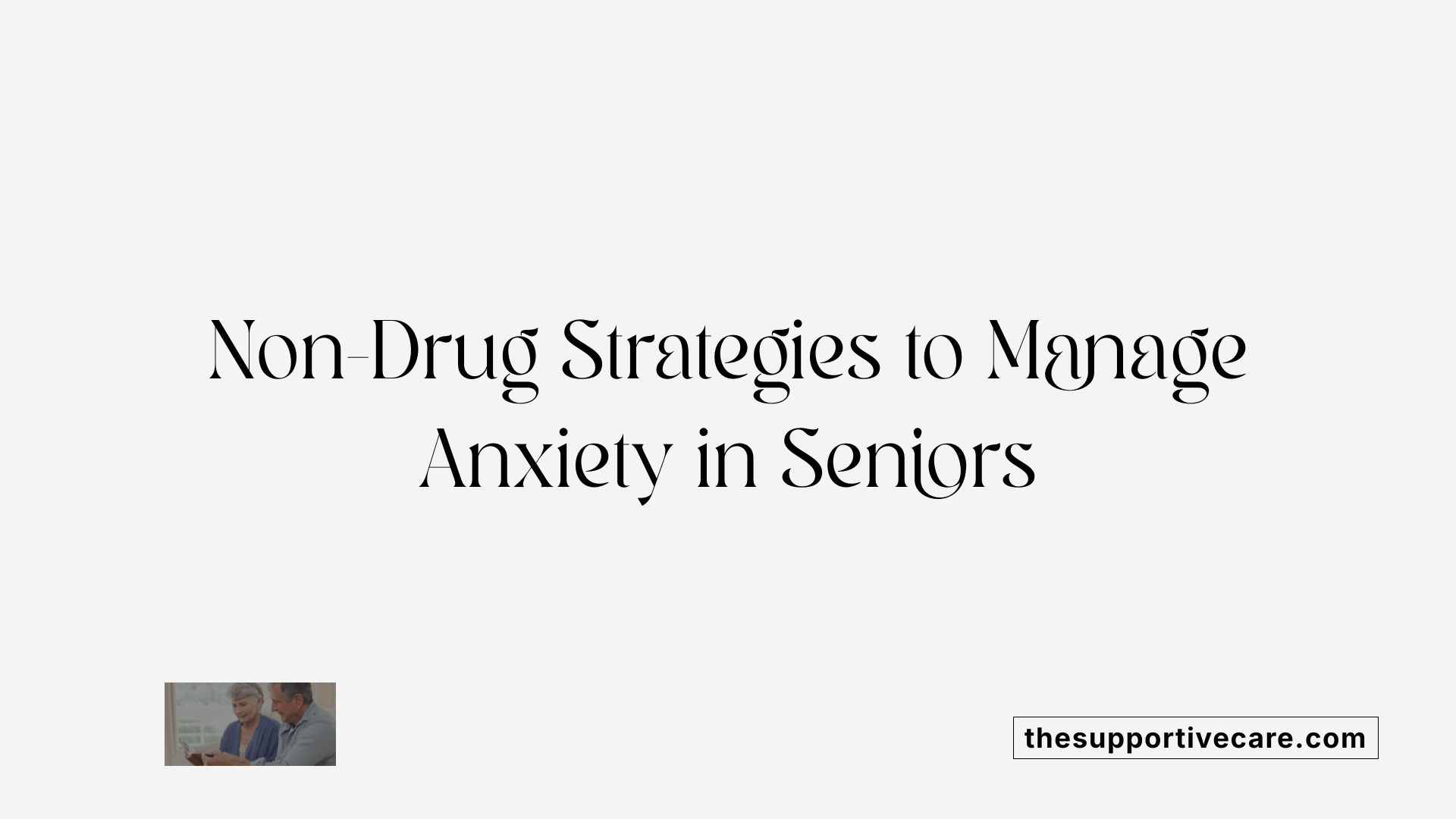 There are numerous non-drug approaches that can safely and effectively help seniors manage anxiety symptoms. Evidence-based therapies such as cognitive-behavioral therapy (CBT) and Acceptance and Commitment Therapy (ACT) are widely recognized for their ability to reduce excessive worry, fear, and physical symptoms. These interventions teach individuals to identify and modify negative thought patterns, improve emotional regulation, and develop coping skills.
There are numerous non-drug approaches that can safely and effectively help seniors manage anxiety symptoms. Evidence-based therapies such as cognitive-behavioral therapy (CBT) and Acceptance and Commitment Therapy (ACT) are widely recognized for their ability to reduce excessive worry, fear, and physical symptoms. These interventions teach individuals to identify and modify negative thought patterns, improve emotional regulation, and develop coping skills.
Relaxation exercises, mindfulness practices, yoga, and music therapy are additional strategies that promote calmness and mental clarity. Techniques like deep breathing, progressive muscle relaxation, and guided imagery help regulate the body's stress response. Mindfulness and meditation foster present-moment awareness, which can prevent ruminative thoughts that intensify anxiety.
Engagement in social and recreational activities plays a vital role in alleviating feelings of loneliness and isolation. Participating in community programs, hobbies, or group exercise creates social connections that bolster emotional well-being.
Horticulture and gardening serve as therapeutic activities, offering gentle physical activity, sensory stimulation, and a sense of achievement. Tending plants and spending time outdoors can markedly improve mood and reduce anxiety levels.
For seniors with dementia-related anxiety, specialized supportive therapies are available. Music therapy has shown remarkable benefits in calming agitation and distress. Additionally, caregiver training programs like the STAR (Staff Training in Assisted living Residences) approach provide caregivers with techniques to manage anxiety effectively, ensuring a safe and comforting environment.
Overall, these non-pharmacological approaches are safe, adaptable, and can be personalized to fit individual health status and preferences. Combining these strategies with medical treatment, when necessary, offers a comprehensive approach to managing anxiety in older adults.
Caregiver Strategies to Support Elderly Individuals with Anxiety
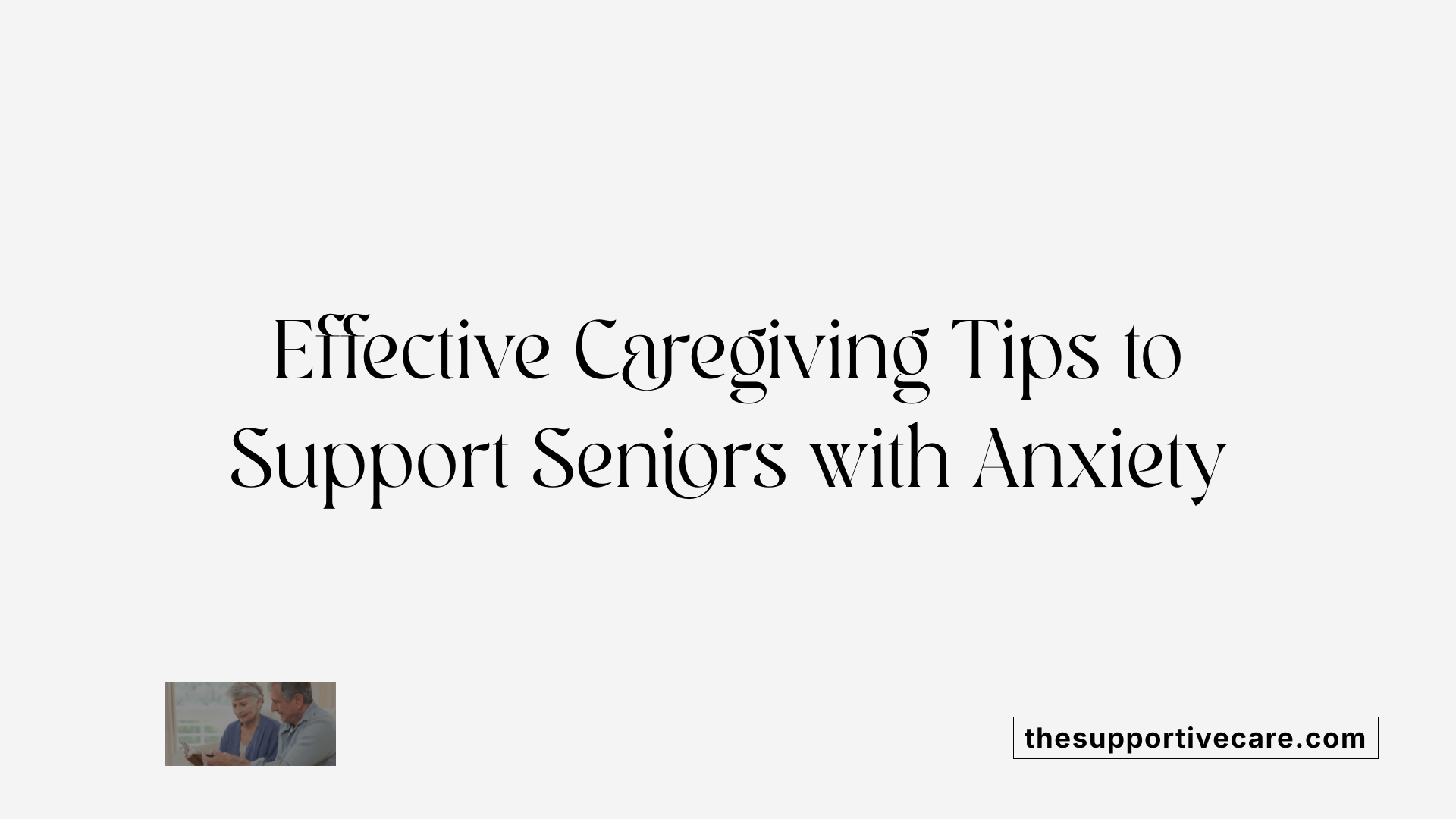
What are recommended caregiver strategies for supporting elders with anxiety?
Supporting elders experiencing anxiety involves creating a safe and predictable environment. Caregivers should establish daily routines that provide comfort and stability, such as regular meal times, consistent sleep schedules, and calming activities. Offering reassurance and gentle guidance helps reduce fears and fosters trust.
Encouraging social interactions and engaging in meaningful activities can significantly improve an elder's mood and reduce feelings of isolation. Activities like walking, gardening, or participating in community groups promote physical and emotional well-being.
Managing caregiver stress is vital. Caregivers should seek social support through friends, family, or support groups. Utilizing respite care options allows caregivers to take needed breaks, preventing burnout. Connecting with professional resources, including counseling or caregiver training programs, can provide additional support.
Relaxation techniques like deep breathing exercises, mindfulness, and meditation are effective for both caregivers and elders. These practices help manage stress and promote relaxation during challenging moments.
Recognizing signs of stress or anxiety in oneself is important. If feelings of overwhelm or fatigue emerge, caregivers should seek support or professional help, including therapy such as cognitive-behavioral therapy (CBT). This not only benefits the caregiver’s mental health but ensures they can offer effective emotional support.
Building a collaborative relationship with healthcare providers ensures ongoing monitoring and tailored care plans. Communicating regularly with doctors, therapists, and social workers can help address emerging issues promptly.
Overall, caring for elders with anxiety requires patience, understanding, and attention to both the elder's and caregiver’s needs. Prioritizing self-care, stress management, and professional assistance enables caregivers to provide compassionate, effective support and improve the overall well-being of their loved ones.
Importance of Sleep, Routine, and Environment in Anxiety Management
How do sleep hygiene and establishing regular routines help in managing anxiety?
Good sleep habits are vital for reducing anxiety symptoms in older adults. Consistent sleep schedules, relaxing bedtime routines, and avoiding stimulants like caffeine before bed can improve sleep quality. Establishing a predictable routine helps the mind and body know what to expect, reducing uncertainty and stress.
Why does a familiar and calm environment matter?
A quiet, cozy space with minimal clutter and soothing colors creates a sense of security. Such environments lower agitation and help seniors feel more relaxed, which can prevent anxiety from worsening. Personal objects, photos, and calming sounds like nature noises support a feeling of familiarity.
How can engaging in meaningful daily activities reduce anxiety?
Activities like gardening, reading, or light exercise promote mental engagement and distract from worry. This sense of purpose fosters self-esteem and reduces feelings of helplessness, which are linked to anxiety.
What strategies can improve sleep quality?
Practices like limiting screen time before bed, maintaining a regular sleep schedule, and using relaxation techniques like deep breathing or meditation help improve sleep. Ensuring the bedroom is dark, cool, and comfortable further supports restful sleep.
How does routine minimize stress and unpredictability?
A structured daily schedule offers stability and predictability, easing feelings of uncertainty and fear. Routine activities reduce the need for decision-making, conserve energy, and provide a sense of control, all of which diminish anxiety.
| Strategy | Benefit | Practical Tip |
|---|---|---|
| Sleep hygiene routines | Better sleep quality | Stick to a consistent bedtime and wake-up time |
| Calming environment | Reduced agitation | Use soft lighting and soothing sounds |
| Engaging activities | Increased purpose and distraction | Incorporate hobbies like art or gentle walking |
| Regular routines | Less unpredictability and stress | Create daily schedules for meals, activities |
| Stress reduction techniques | Lower anxiety levels | Practice deep breathing or meditation daily |
Adopting these strategies can significantly help older adults manage anxiety more effectively, leading to improved overall well-being.
Holistic and Community Support Resources for Elder Anxiety
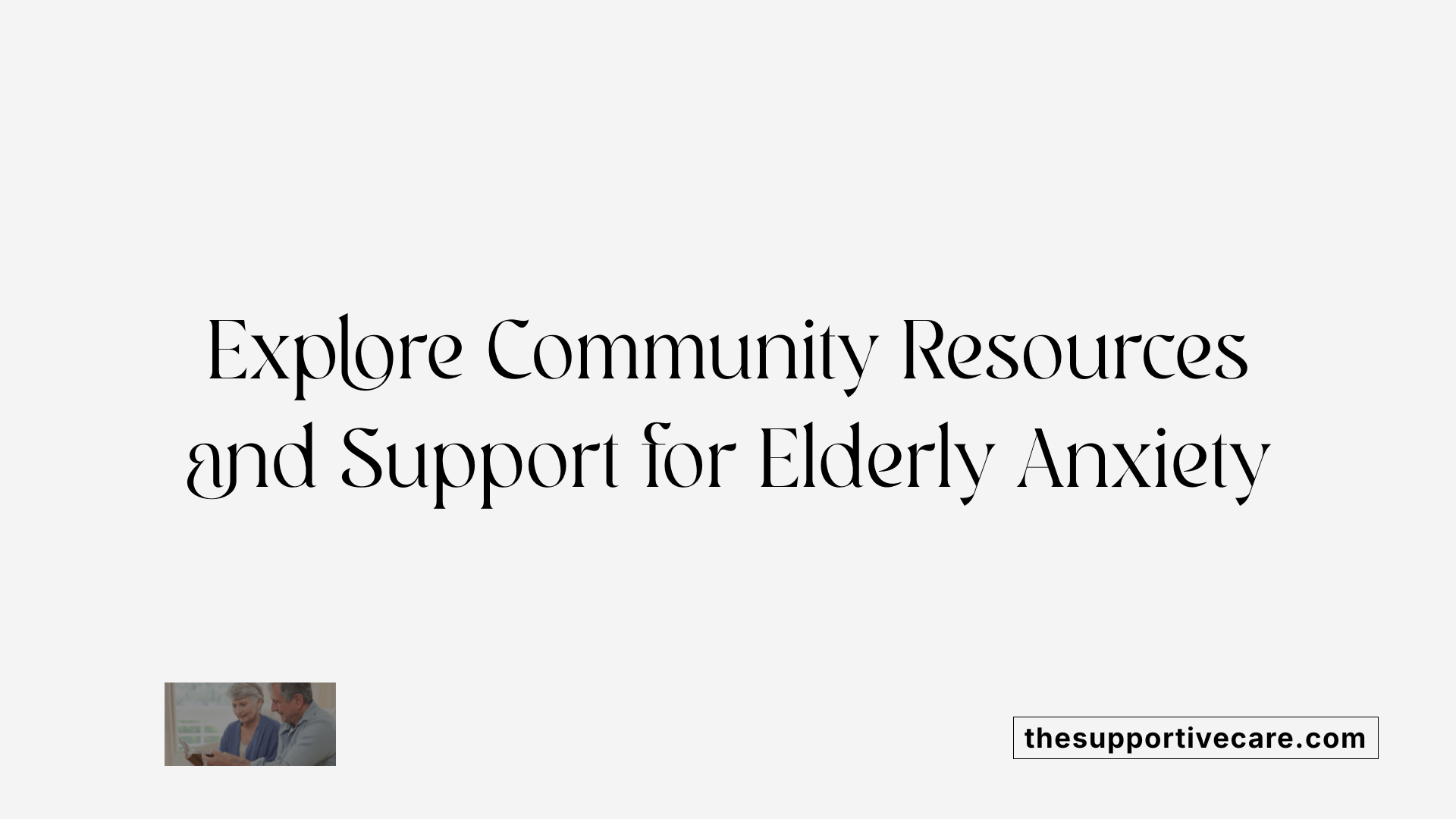
Support groups and community programs
Various local and online support groups provide a safe environment for older adults to share experiences and learn coping strategies for anxiety. Community centers, senior centers, and mental health organizations often host these programs, encouraging social interaction and peer support.
Educational resources from organizations like CMHA and Anxiety Disorders Association of Canada
Organizations such as the Canadian Mental Health Association (CMHA) and the Anxiety Disorders Association of Canada offer valuable educational materials. They provide guides, workshops, and online information on understanding anxiety disorders, treatment options, and self-help strategies tailored for seniors.
Professional counseling and psychotherapy services
Access to mental health professionals, including psychologists and licensed therapists, is crucial. Evidence-based therapies like cognitive-behavioral therapy (CBT) are effective in managing anxiety. Many communities have outpatient clinics or telehealth services to facilitate easy access.
Care management and mental health evaluations
Dedicated care managers can coordinate comprehensive assessments for seniors, including mental health evaluations. These evaluations help identify underlying causes of anxiety, co-occurring conditions, and appropriate treatments, creating personalized care plans for better outcomes.
Final Thoughts: Embracing a Compassionate, Holistic Approach
Managing anxiety in older adults without overmedication requires a comprehensive, compassionate approach that integrates psychological therapies, lifestyle changes, caregiver involvement, and community resources. Early recognition and tailored interventions can significantly enhance the quality of life while avoiding the risks associated with pharmacologic treatments. By fostering understanding, patience, and supportive environments, caregivers and healthcare providers can empower seniors to navigate anxiety effectively, promoting mental health and overall well-being in elder care.
References
- Anxiety and Older Adults: A Guide to Getting the Relief You Need
- Anxiety and Older Adults: Overcoming Worry and Fear
- 10 Ways to Relieve Anxiety in Seniors
- Clinical practice guidelines for Geriatric Anxiety Disorders - PMC
- Anxiety in Seniors: 6 Ways to Cope Without Medications
- What doctors wish patients knew about managing anxiety disorders
- Managing Anxiety in Seniors: Simple Strategies That Work
- How to treat anxiety without medication: Natural remedies
- Anxiety in the Elderly: Symptoms and Restorative Strategies



































































































